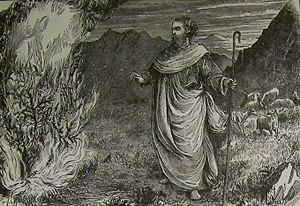 Image via Wikipedia
Image via WikipediaTo try to make such an event into a mere historical fact or a mere historical falsehood or just a metaphor or any other easily accepted and comprehended label is a stumbling block because it denies or ignores the mystery at the heart of the matter.
As I am slowly coming to see it, if it were a simple thing that could be fully comprehended and conclusively decided at the level of our ordinary intellect, then it would just be an idea to reject or accept based on everyday standards for ideas. Instead, events such the Paschal mystery (including that of the Resurrection and the Ascension) are explored by living them out through liturgy and charity.
To base ones belief solely on historical records and accounts or on what other people publicly profess is not a solid foundation. It can be challenging to be able and willing to develop faith which is patient with uncertainty and which allows us dive into paradox. A faith which does have to grasp at fixed and final answers, either in terms of the Biblical exegesis of difficult passages or in terms of the great existential questions. It is a faith in which we trust the most fundamental insights of contemplative religion and the core ideas expressed by our tradition(s) -- that reality is greater than we can imagine in our current understanding of existence:
1) that meaning and value are inherent in our existence and not dependent on our material/social status/beliefs/etc, and
2) that the most real thing of all is divine love experienced as boundless wisdom and compassion.
The rest of a religion follows and flows from these core truths. In Christianity, this follows the life of Christ. The fact that many details his life and the events surrounding it are shrouded by history doesn't obviate the impact his life had on his disciples and their students. Nor does it counter ones own experience of the mystery in ones own life. This cannot be proved solely or even primarily by argument or by measurement.
Those who have tried to do so in the past and who still try to do so today are often still grasping at how to deal with their discomfort with actual faith, which requires that one pass through ambiguity, doubt, and even despair. These feelings reflect the layers of our assumptions and preferences about the world and how it operates that we are digging through. This kind of surrender is similar to the concept of falsifiability in science, the willingness to be proven wrong, but it digs much deeper.
Many do not want to go any further than they already have and decide they have dug far enough. That they'll just rest on what remains of their certainty about life (and death). They may be bunkered better than those at shallower depths from the slings and arrows of outrageous fortune, but deep quakes such as genocide, torture and other tragedies and horrors can still reach them and shake their foundations. Their faith is still not on solid ground. It still depends on their consent on their terms based on their expectations of what God can do or ought to do. God is still another being, just a really powerful person, like a jealous king, to be obeyed and possibly feared.
When such faith in one's assumptions about God are challenged it can open one to a broader experience of God or close one off to any meaningful consideration of or conscious seeking of God. Sometimes it can do both. It turns out I needed to go through agnosticism, strong atheism, and even radical anti-theism to purge myself of "the God I thought I knew" so I could be open to the possibilities of the God I never expected or could have previously taken seriously. Never judge. You don't know how things will turn out or whether it will be what you consider to be "for the best".
It can in Biblical language be terrifying to stand naked before God, or in Buddhist terms to ponder ones original face (i.e. before one was conceived). However you phrase it, to let go and surrender your comfort, certainty, and sense of control when it comes to the big existential questions, to be willing to go beyond the traditional roles and categories we dress ourselves in, is something that many of us are not ready to do. If you meet the Buddha on the road you are advised to kill her, because she is only your idea of the Buddha, and the road is the bounded set of possibilities you are willing to accept. We can get complacent with a sense of ourselves, our notions of God, and hence of our very existence.
The solid rock is the rock of no rock -- it is the rock that is beyond our limits and expectations. All we can do is trust in it. It is "the thought that is nowhere supported" that inspired the 6th ancestor of Ch'an (aka 6th Patriarch of Zen), Hui Neng. The thought that doesn't rely on pre-conceived ideas or desires. When it comes to faith, all other ground is sinking sand.


No comments:
Post a Comment
Hello! Thanks for leaving a comment.
Everything but spam and abusive comments are welcome. Logging in isn't necessary but if you don't then please "sign" at the end of your comment. You can choose to receive email notifications of new replies to this post for your convenience, and if you find it interesting don't forget to share it. Thanks!